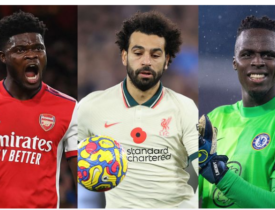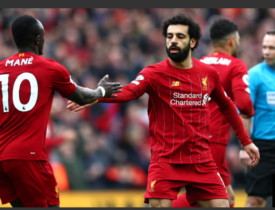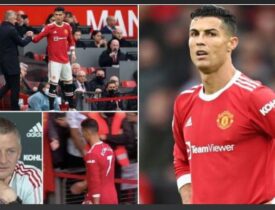Escalating violence in Cameroon will threaten the safety of Premier League stars when the Africa Cup of Nations begins next month, human rights activists have warned.
The African showcase includes 24 teams from across the continent and is set to open on January 9, but there are now calls for it to be postponed because of the conflict.
The competition is likely to feature more than 40 players from the English top flight, including Thomas Partey, Nicolas Pepe and Mohamed Elneny, from Arsenal; Trezeguet from Aston Villa; Chelsea’s Edouard Mendy; Crystal Palace’s Wilfried Zaha; Manchester City’s Riyad Mahrez and the Liverpool trio of Mohamed Salah, Sadio Mane, Naby Keita.
Despite the growing fear that teams and the tournament could be targeted in an increasingly bitter and violent conflict, there is no sign that the event will be postponed or even the plans changed to reduce the risk.

Most of the discussion surrounding the tournament has focused on the release date for Europe’s elite players and the risk of contracting Covid.
This week, the Confederation of African Football (CAF) President Patrice Motsepe met with Cameroon President Paul Biya and insisted the showpiece would go ahead as planned.
However, human rights organisations have told Sportsmail they believe there is a real risk for players and staff and the tournament should be postponed, or at the very least, matches moved from the South West region, which is considered the most dangerous.
Violence first flared four years ago between separatist groups in the English speaking west of the Central African country, known as the ‘anglophone zone’, and the Government of the largely French speaking, francophone, Cameroon.
The conflict has intensified dramatically this year and human rights activists say there have been 80 bombs detonated in the anglophone region since January, and there have been many deaths, including policemen, soldiers, civilians and a five-year-old girl.
A large area of south west Cameroon is now under a night-time curfew.

Even the tournament’s mascot, Mola the lion, wore a bullet-proof vest over his Cameroon strip as he toured the conflicted region last week.
Mola, which is a convivial name, meaning friend, elder or uncle, was also escorted by a detachment of heavily armed troops.
‘There are now mounting calls to delay the AFCON competition until the warring parties call for a ceasefire and enter peace negotiations,’ Rebecca Tinsley, a human rights researcher and a member of the Global Campaign for Peace and Justice in Cameroon told Sportsmail.
We are saying postpone the tournament because all of this threat could be removed if the government just said, “yes, we will have peace talks
There appears to be little chance of that with the Government determined to show no weakness in the face of the threat from its South West and North West regions.
One of the six tournament stadiums, Limbe, is the only one located in the contested ‘anglophone zone’, although two more at Bafoussam and Douala are hard on its borders and it is feared they could also be targeted.
‘There is a real risk of… attacks in all AFCON venues, especially in Limbe,’ observed Tinsley.
With a capacity of 20,000, the Limbe Stadium is set to host six group matches.
Among the six teams due to play in the group stage in Limbe, 190 miles from the capital Yaounde, are Mali, for whom Brighton’s Yves Bissouma and Southampton’s Moussa Djenepo, are expected to play.
However, the town is also slated for two round of 16 games, which could see any four of the 24 participating countries forced to play in the conflict hotspot.
‘English clubs should be really cautious about sending their players into a very unstable situation. There are real dangers,’ Tinsley added.
‘You only have to look at the record of the armed militias and separatist groups. They have exploded more 80 improvised explosive devices and they are becoming increasingly sophisticated in their tactics.
‘This should alarm any football club thinking of sending players into the region.’
The European Club Association has already written to the CAF, but predominantly to highlight the risks of Covid and threatening to block the release of players.
However, those with knowledge of the country suggest conflict and violence is a far greater concern.
Threats have appeared widely online warning the Cameroon authorities not to play matches in the west of the country, an area the separatists call, Ambazonia.
And separatists warn players not to come.
One commentator, Mark Bareta, an author and activist for the cause, based in Belgium, who describes himself in his Twitter profile as ‘standing for the people of the Former British Southern Cameroons (Ambazonia)’ posts warnings on Twitter and celebrates the defeat of Government soldiers.
‘Cameroun is at war with Ambazonia,’ he wrote in one post. ‘Players taking part do so at their own risks.’
The Cameroon Crises
The conflict in the Central African country of Cameroon is largely hidden from international audiences.
In global terms, it is not a geopolitically significant dispute, but for the millions of people whose lives are blighted, ruined, or ended by the violence, it is defining.
Now international football has run into the fray and suddenly it takes on more significance in the wider world.
The problem crystalised in 2016. English-speaking areas of Cameroon (anglophone) felt they were marginalised by the French-speaking (francophone) majority.
The anglophone regions of the South West and North West, which the separatists call Ambazonia, account for about one fifth of the 20 million population.
They felt the Cameroon government under President Paul Biya, 88, who has ruled since 1982, was trying destroy their traditional education and legal system, which was based on English traditions and common law.
In 2016, lawyers and teachers protested peacefully but according to human rights organisations a heavy-handed government crushed their dissent.
The argument became radicalised. Now, there are multiple armed groups who claim to represent the western reaches of Cameroon. For four years conflict has intensified with militia targeting soldiers and policemen, but also civilians who do not demonstrably back them.
One move has been to demand schools remain closed to create leverage on the francophone government. Education is at the heart of the conflict.
As a result, most schools have been closed for years and 700,000 children have been deprived of an education, while Human Rights Watch has reported how student and teachers have been horribly abused, mutilated and killed.
But according to activists, the government has also committed atrocities and abuses. It has sent thousands of soldiers west, but they seem unable to stop the separatists and have not won the confidence of the locals.
The failure has resulted in 700,000 people fleeing from this corner of Africa, which is about to stage the continent’s Cup of Nations.
While human rights groups disagree on how best to manage Afcon, they are clear that the world needs to wake up to a cruel and devastating conflict, which they say, may also threaten the safety of some of Europe’s most famous footballers.
Latest Posts
- How to withdraw from 1XBET
- Chelsea’s Koulibaly is charging fans N̵34k for video messages despite earning N̵3Billion per year
- CAF launches Africa’s Super League with prize money of N̶41Billion
- Napoli President says he will no longer sign African players ‘unless they sign AFCON Agreement’
- How to load Booking Code on 1XBET

















